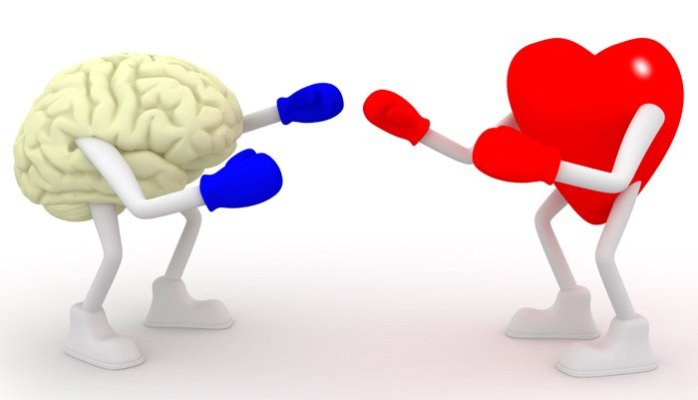Should You Follow Your Heart or Your Head?
You've probably heard it so many times "Follow your heart". It’s a common advisory phrase that we have all received or given at some point when deciding about a relationship, a career, a place to live, what to do in a current situation or a possible future situation. "Follow your heart" essentially means "do what feels right".
On the surface following your heart seems like a great idea. It seems like the most natural thing to do because we are by our very nature driven by our emotions. However, the tough bit about following your heart is that sometimes your heart can take you to places you shouldn't be and because feelings are faster than logic, it can take you to that place very quickly. The heart does not come from a place of logic or reason. Its purpose is to love, and it draws to us the people and things we desire, not necessarily those that will lead to a better life.
On the flip side, your brain has for the most part been programmed by your environment over time and it is based on a belief system, a belief system that most of us were too young to make a choice in whether to accept or not. This can lead to making choices that are not good for us either. That said, do not let your heart or your head do the decision making alone. It is only when your heart and your intellect work together in unison that you will live an authentic peaceful life.
You could liken your heart to your inner GPS system. Imagine driving down a road and you are having a great time. It feels right and you go forward with ease and joy. Then you come to a sign that says there is a very dangerous oil spill ahead. Imagine that sign to be your logical brain. Your heart wants to continue but your brain tells you that if you take that route, you could put yourself in danger. What do you do, listen to your heart or listen to your head?
If you were in an abusive relationship, for example, and your heart is in love with your partner, your natural inclination might be to gravitate to the part of the relationship that felt good. But when your brain raises a flag that tells you to question the quality of your relationship and your safety, it would be wise to listen to your head, not just your heart, wouldn’t it?
Your happiness is your responsibility and your happiness will ultimately be determined by the decisions you make. Lead with your heart but take your brain with you! Here are a few tips to get your heart and your head to work in unison.
Listen to your heart’s intuition but pause before making any decision.
Take time out and allow yourself to become relaxed and silent. Breathing slowly in the comfort of a relaxing space will help you do this. Allow at least twenty minutes of relaxation before you think about your decision. In the space of silence your heart and your head will consult with each other productively. The following questions are great questions to ask:
- “Do I feel good around this choice or person?”
- “Does this situation or person give me or take my energy?”
- “Do I feel empowered or disempowered?”
- “Am I going toward an adventure or running from fear?”
- “Am I listening to my lessons learned from the past?”
- “Would I make the same choice if I had a million Euros in my pocket now?”
- “Do I feel respected and valued?”
- “Am I trying to control the situation or am I leaving room for expansion?”
Write out the pros and cons of making the decision.
A great way to approach a decision-making situation is to write out the pros and cons. Get a page and divide it into two columns. In column 1 write “Consequences of doing X” (X indicates the decision to be made) and in the second column put “Consequences of Not Doing X” Writing it out will allow the logical part of your brain to activate as you “feel” your decision. Then when you’ve filled in your two columns, read what you’ve written aloud. Reading them aloud will give you a very real and possibly different perspective of your situation and decision.
Sleep On it!
When we sleep our brain naturally organises and files information and emotion. It will, through a metaphorical dream process, try to resolve any intense emotion you experience day-to-day, allowing you to wake up with a clear head.
Approach the situation from someone else’s point of view.
Think of someone you respect and ask yourself what they would do and how they would do it. A different perspective can change everything. If you need extra help, ask for it.
Surround Yourself with Productive Positive Thinkers.
If you have a decision to make and you are surrounded by negativity, it will be very difficult for you to make a good decision. Negativity fogs the mind. Being around people who are positive can be much more helpful. It is a known fact that positive thinking allows for clarity, focus and productive decision making. If you’re not where to find such people, consider attending the Women’s Empowerment Summit. Full details at http://wesummit.ie

